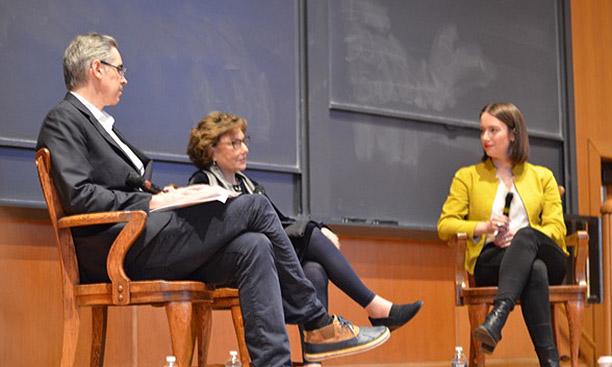

The mainstream media’s approach to covering the Russia investigation has largely been misguided, Atlantic staff writer Julia Ioffe ’05 said during a Jan. 23 campus talk.
“In general, there’s a lot of hysteria,” said Ioffe, whose article, “What Putin Really Wants,” is the cover story of the latest issue of The Atlantic. “There was a lot of nefarious activity with the Russians’ engagement, but it’s really unclear to me that they were as effective as many people think.”
Ioffe, who was born in Russia and has spent much of her career reporting in the country, believes Russian interference likely played a minor role in the 2016 election. “I think people are falling into the trap of seeing Putin and the Russians as much more powerful and capable and competent than they really are, blaming what happened in 2016 on an outside power,” she said.
“I think people are falling into the trap of seeing Putin and the Russians as much more powerful and capable and competent than they really are...”
— Julia Ioffe ’05
“Even if Putin knew in great detail about the DNC hack and oversaw the purchase of each of the hundreds of thousands of dollars worth of Facebook ads — which I don’t think he did — he didn’t create Donald Trump,” she said. “He didn’t create two, three decades of Fox News tilling the fields so that Trump fell on fertile soil. He didn’t create a racist backlash to the first black president. He didn’t create anger at larger historical patterns like globalization.”
“These are all things we did, that we’re responsible for, and I think Putin was working at the margins,” Ioffe said. “By going so deep into the weeds of ‘who is Mueller interviewing now?’ we miss this broader picture.”
Ioffe believes the media fixation on the Russia investigation reflects a larger trend towards ratings-based news. “We’re focusing on the tweets and we’re focusing on the racist comments and the misogynistic comments, while all of this un-sexy but much more important stuff is getting done under the cover of that,” she said. Complicated and undercovered stories like the impact of judicial appointments or changes to the EPA, Department of Education, and Justice Department are “going to be with us for 30 to 40 years,” she said.
Regardless of the results of the Russia investigation, Ioffe believes one thing is for certain: “In trying to navigate this universe, I think the mainstream media is going to make a lot of mistakes that it’s going to pay very dearly for in the future.”